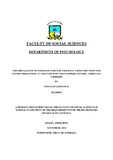Please use this identifier to cite or link to this item:
https://cris.library.msu.ac.zw//handle/11408/2640Full metadata record
| DC Field | Value | Language |
|---|---|---|
| dc.contributor.author | Mbatani, Loraine R. | - |
| dc.date.accessioned | 2017-07-12T13:00:32Z | - |
| dc.date.available | 2017-07-12T13:00:32Z | - |
| dc.date.issued | 2014 | - |
| dc.identifier.uri | http://hdl.handle.net/11408/2640 | - |
| dc.description.abstract | The study sought to find out the prevalence of intimate partner violence among HIV infected women. The research was conducted at FACT Chiredzi New Life post-test support centre. The research was prompted by the realisation that the prevalence of intimate partner violence, combined with the severity of its impact at many levels, on HIV infected women affects their ART uptake and wellbeing. Simple random sampling was employed to get a sample of 60 participants who were HIV infected women. A self-administered questionnaire was used to collect data for the study. Data presentation was done descriptively and SPSS was used for data analysis. Main findings were that though a substantial minority of HIV positive women do not experience physical violence, the prevalence of physical violence among HIV infected women is more than 50%.The most prevalent form of physical abuse among HIV infected women is that of being stroke by partner with his hands /feet though only a few get visible injuries. Findings on the prevalence of sexual abuse indicated that 48, 3% of HIV infected women are not sexually abused and their partners understand them when they don’t feel like sex whilst 51, 7% are sexually abused and their partners don’t understand them when they don’t feel like sex. On the prevalence of emotional abuse among HIV infected women, over 50% of them are sometimes emotionally abused by their partners as they feel controlled or isolated by their partners, kept away from friends or relatives, humiliated by partners and partners destroy things they care about. Furthermore, the research findings of this research indicated that HIV positive women are sometimes verbally abused by their intimate partners However, a greater percentage of 88, 3% indicated that they quarrel much very often about financial matters with their partner. Therefore the most prevalent form of intimate partner violence among HIV infected women being physical abuse followed by emotional abuse, tailed by sexual abuse and lastly verbal abuse. Having recognised the prevalence of intimate partner violence among HIV infected women the researcher recommends organisations that offer post-test support services to develop, implement and monitor programmes aimed at primary prevention of intimate partner violence against women. These should include sustained public awareness activities aimed at changing the attitudes, beliefs and values that condone partner violence as normal and prevent it being challenged or talked about. The researcher also recommends women to identify the warning signs of IPV and speak up if they suspect intimate partner violence or abuse. | en_US |
| dc.language.iso | en | en_US |
| dc.publisher | Midlands State University | en_US |
| dc.subject | HIV | en_US |
| dc.subject | Women | en_US |
| dc.subject | Violence | en_US |
| dc.title | The prevalence of intimate partner violence among HIV infected women presenting at new life post test support centre , Tshovani, Chiredzi | en_US |
| item.languageiso639-1 | en | - |
| item.grantfulltext | open | - |
| item.fulltext | With Fulltext | - |
| Appears in Collections: | Bsc Psychology Honours Degree | |
Files in This Item:
| File | Description | Size | Format | |
|---|---|---|---|---|
| LORAINE MBATANI DISSERTATION .pdf | Full Text | 1.56 MB | Adobe PDF |  View/Open |
Page view(s)
114
checked on Apr 5, 2025
Download(s)
58
checked on Apr 5, 2025
Google ScholarTM
Check
Items in MSUIR are protected by copyright, with all rights reserved, unless otherwise indicated.



